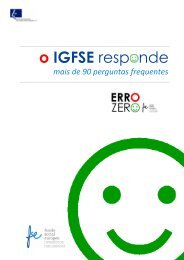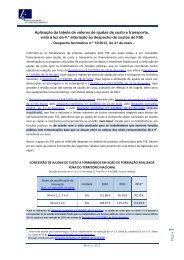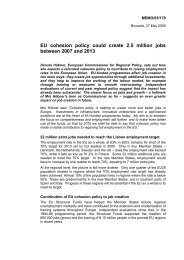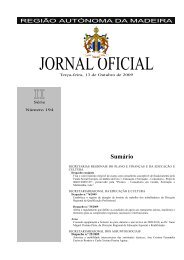Industrial Relations in Europe 2012 - European Commission - Europa
Industrial Relations in Europe 2012 - European Commission - Europa
Industrial Relations in Europe 2012 - European Commission - Europa
Create successful ePaper yourself
Turn your PDF publications into a flip-book with our unique Google optimized e-Paper software.
l<strong>in</strong>ked to the <strong>Europe</strong> 2020 strategy and the <strong>Europe</strong>an Year for Active Age<strong>in</strong>g and Solidarity<br />
between Generations <strong>2012</strong>. The <strong>Commission</strong> has welcomed the priority given by the <strong>Europe</strong>an<br />
social partners <strong>in</strong> this sector to key issues such as demographic change, work/life balance, lifelong<br />
learn<strong>in</strong>g and health and safety, not<strong>in</strong>g that their contribution is crucial for the <strong>Europe</strong>an Union to<br />
meet the objectives of the <strong>Europe</strong> 2020 Strategy.<br />
The subject of active age<strong>in</strong>g was also discussed by the social partners work<strong>in</strong>g on common<br />
guidel<strong>in</strong>es <strong>in</strong> the hospitals and healthcare sector. Further, the social partners <strong>in</strong> the chemical<br />
sector adopted general remarks <strong>in</strong> January 2011 on the <strong>Commission</strong>'s Green Paper towards<br />
adequate, susta<strong>in</strong>able and safe <strong>Europe</strong>an pension systems. The <strong>Europe</strong>an Chemical Employers<br />
Group (ECEG) and the <strong>Europe</strong>an M<strong>in</strong>e, Chemical and Energy workers' Federation (EMCEF) state<br />
that they subscribe to the most of the targets presented <strong>in</strong> the <strong>Commission</strong>'s document, however,<br />
they perceive some specific goals to be <strong>in</strong>adequate, particularly the provisions on occupational<br />
pension schemes. Furthermore, the social partners expressed their disagreement with the procedure<br />
followed by the <strong>Commission</strong> and argued that they were <strong>in</strong>sufficiently consulted on the issue. The<br />
social partners did, however, note that the exist<strong>in</strong>g <strong>in</strong>stitutions concern<strong>in</strong>g pension policy at the<br />
<strong>Europe</strong>an level are sufficient.<br />
The sectoral social partners <strong>in</strong> the temporary agency work sector, the <strong>Europe</strong>an Confederation of<br />
Private Employment Agencies (Eurociett) and UNI <strong>Europa</strong>, prepared and launched a jo<strong>in</strong>t project<br />
on Temporary agency work and transitions <strong>in</strong> the labour market. The project aims to assess the<br />
possible role of the sectoral social partners <strong>in</strong> facilitat<strong>in</strong>g transitions <strong>in</strong> the labour market (from<br />
education to work, from unemployment to work, and from different types of labour contracts). It<br />
looks at the profile of temporary agency workers (skills level, age, gender, ma<strong>in</strong> sectors <strong>in</strong> which<br />
they work) and at the career of temporary agency workers (for example, the situation before and<br />
after temp<strong>in</strong>g, average length of assignment, types of labour contracts offered to them, quality of<br />
transitions and applicable work<strong>in</strong>g conditions). The project also aims to f<strong>in</strong>d out to what extent<br />
some agency workers might be <strong>in</strong> a precarious situation, focus<strong>in</strong>g <strong>in</strong> particular on women, migrant,<br />
low-skilled and older workers. In a further development, dur<strong>in</strong>g the past two years the social<br />
partners <strong>in</strong> this sector have supported their national members dur<strong>in</strong>g the implementation phase of<br />
Directive 2008/104/EC on temporary agency work. In close cooperation with their global<br />
counterparts, Eurociett and UNI <strong>Europa</strong> also promoted the ratification of ILO Convention 181 on<br />
Private Employment Agencies as a relevant <strong>in</strong>ternational framework for regulation on temporary<br />
agency work and as a way to promote decent work. The f<strong>in</strong>al conference of the project took place <strong>in</strong><br />
December <strong>2012</strong>.<br />
In April <strong>2012</strong>, the social partners <strong>in</strong> the commerce sector issued a jo<strong>in</strong>t contribution on social issues<br />
for the <strong>Europe</strong>an Retail Action Plan which is be<strong>in</strong>g prepared by the <strong>Europe</strong>an <strong>Commission</strong>. The<br />
ma<strong>in</strong> policy objective of a this Action Plan is to ensure a consistent and systemic approach to the<br />
treatment of issues identified as hamper<strong>in</strong>g the provision of more efficient and fair retail services <strong>in</strong><br />
<strong>Europe</strong>. In their contribution, the social partners call upon the <strong>Commission</strong> and the Member States<br />
to: promote social dialogue, collective barga<strong>in</strong><strong>in</strong>g and the development of free and democratic trade<br />
unions and employers organisations across the EU; promote and fund <strong>in</strong>itiatives for improv<strong>in</strong>g<br />
health and safety at the workplace and foster<strong>in</strong>g a more <strong>in</strong>clusive labour market; take all possible<br />
action to fight the use of undeclared work, while reduc<strong>in</strong>g adm<strong>in</strong>istrative burdens, especially for<br />
SMEs, as an <strong>in</strong>centive to develop regular activities; support projects aimed at identify<strong>in</strong>g skills<br />
278

















